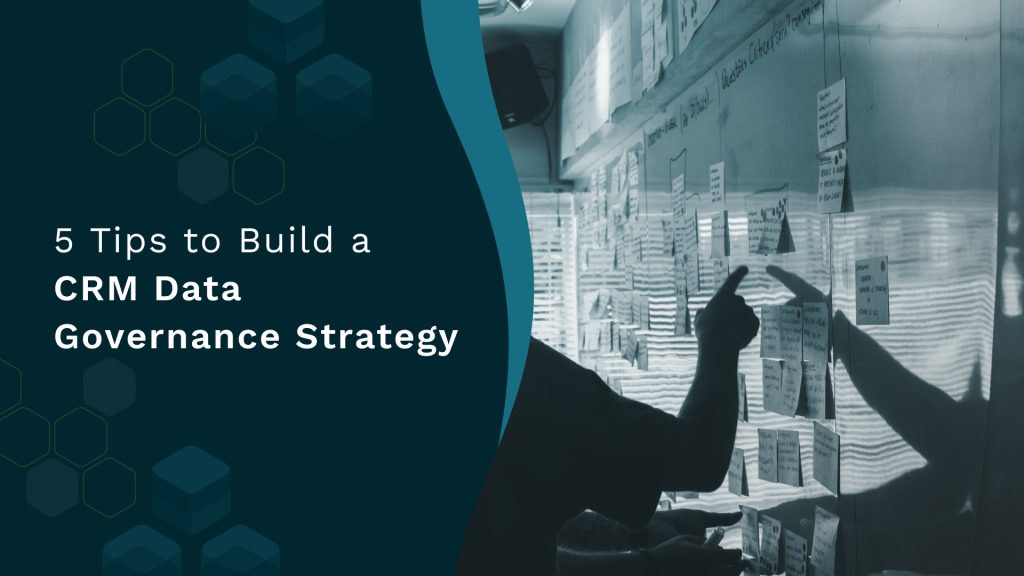CRM data governance relies on a solid system.
This includes implementing processes to ensure the data seamlessly flows in the system across departments, while simultaneously maintaining the quality, usability, and accessibility of this data.
CRMs are are considered an upgrade or a quick fix to marketing, sales, and service performances. The data gathered is meant to be constantly updated and free of duplicates or copies. But most data in CRM is dirty.
After encountering failures with this mindset, companies often feel discouraged and are unable to get the hang of the problem. They start blaming the CRM capabilities when in fact the underlying problem lies in their very own database.
Many, if not most, business owners pay no attention to the contact rearrangement or standardization of data and run new strategies based on outdated or siloed data.
CRM data governance emphasizes the best practices to tackle these problems so organizations can rely on an updated and single data source to drive business growth.
Before we move on to how you can go about building a CRM data governance strategy, let’s first understand why it’s needed in the first place.

How Poor CRM Data Affects Revenue
Data can swoop in and save the day by helping you tackle problems, keeping an eye on performance, enhancing your processes, and unraveling the mysteries of your industry.
On the other hand, poor data quality is like having a mischievous gremlin. It can wreak havoc on your business, leaving nothing but chaos and mayhem in its wake.
Here are some ways poor quality CRM data can make you bleed revenue:
1. Shakes up business processes
Since data management serves as a crucial source of information for all departments within a company, any inconsistencies can significantly affect various business operations. Even a small error in the master data can trigger a domino effect that becomes challenging to mitigate once it sets in motion.
Inaccurate data leads to a ripple effect of mistakes across departments and drains significant company resources. Addressing data discrepancies requires allocating corporate resources to conduct root-cause analyses and implement corrective measures, impacting the productivity of your staff in the process.
2. Hinders effective decision-making
When your data is inaccurate, it can throw you off track and lead to some pretty lousy decisions. Imagine relying on faulty reports and dashboards – it’s like driving blindfolded!
Without the right information, your management team will be clueless about what’s really going on in the business. And that’s a recipe for making some really risky and uninformed choices that could seriously hurt your company’s future growth.
3. Puts a wrench in business operations
Consider a scenario where a manufacturing company heavily relies on inaccurate supplier data. They have outdated information about lead times, pricing, and product availability from their suppliers.
As a result, they struggle with unreliable delivery schedules, unexpected price fluctuations, and limited visibility into the availability of key materials. This leads to production delays, missed deadlines, and increased costs.
The company’s ability to fulfil customer orders on time is severely hindered, causing dissatisfaction and the potential loss of valuable business relationships. The poor data quality in supplier information negatively impacts the efficiency and effectiveness of the company’s business operations.
4. Drives up expenditure
Referring to the above example, if the company makes decisions based on inaccurate data, it is possible to end up shipping extra materials to the wrong address at the wrong time, costing the company extra.
These direct costs can put a dent in the company’s profit. Indirect costs can include outdated pricing structures, inaccurate customer segments, and staff dissatisfaction. Fixing all these will cost additional resources and time, which otherwise could have been put to more productive use.
5. Affects regulatory compliance
Compliance is a big deal for any company. You see, these data privacy rules in many countries dictate how personal information should be handled. So, if a company deals with sensitive client data, they gotta go the extra mile to ensure data quality and security.
When it comes to verifying your contacts, it’s important to be thorough with your data quality. You wouldn’t want to accidentally send information to the wrong person just because of a small typo in their email address. That can lead to some serious consequences.
Inaccurate data can even land organizations in hot water, with fines and all. There have been cases where companies had to pay for text messages sent to numbers that had already been given to new owners. So, it’s better to double-check and ensure your data is accurate to avoid any costly mishaps.
5 Tips to Build a CRM Data Governance Strategy
Implementing this process in your CRM may seem overwhelming at first, leading many to pass the responsibility onto someone else once the data is sourced.
However, by focusing on five key concepts, your team can better navigate this task and work towards achieving success.
1. Define clear data standards
Establishing clear guidelines and standards for data entry is crucial to maintain data integrity and consistency. By doing so, businesses can ensure that all customer data is accurately captured and formatted correctly.
This involves defining comprehensive naming conventions, which provide a consistent format for entering customer information. Additionally, implementing data validation rules helps in preventing errors and inconsistencies by validating the accuracy and completeness of the entered data. Setting required fields ensures that essential information is not missed during data entry, enhancing the overall quality of customer data.
By enforcing these guidelines and standards, businesses can rely on a robust and reliable database, enabling better decision-making and analysis based on accurate and consistent customer information.
2. Implement role-based access controls
It’s crucial to grant the right access permissions to individuals based on their specific roles and responsibilities within the organization. This ensures that everyone has the appropriate level of access to perform their tasks effectively while also safeguarding sensitive customer data.
Limiting access to only authorized personnel can significantly reduce the risk of unauthorized access or data breaches. This means that only those who genuinely need to view, modify, or export data will have the necessary permissions, maintaining high data security and integrity.
3. Regularly cleanse and update data
Regular data cleansing is essential to ensure the accuracy and reliability of your data. It involves conducting routine activities to identify and correct any inconsistencies, duplicates, and inaccuracies that may have crept into your database over time.
By running data validation routines, you can check the integrity of your data and identify any potential errors or discrepancies. Data deduplication processes help identify and remove duplicate entries, ensuring a clean and streamlined database.
Additionally, verifying the accuracy of information helps to maintain high-quality data that you can rely on for making informed business decisions.
4. Establish data retention policies
To ensure compliance and efficient data management, it is essential to define clear policies for data retention. These policies should outline how long customer data should be retained based on legal, regulatory, and business requirements. By doing so, organizations can avoid holding onto data for longer than necessary, minimizing storage costs and potential privacy risks.
Organizations should also establish procedures for safely disposing of no longer needed data. This involves securing and permanently deleting data to prevent unauthorized access or potential data breaches. By disposing of unnecessary data in a systematic and controlled manner, organizations can further mitigate privacy risks and maintain data security.
Regularly reviewing and updating these policies and procedures is important to adapt to changing legal and regulatory requirements. By staying informed and incorporating best practices, organizations can ensure that their data retention practices remain in compliance and aligned with industry standards.
Taking a proactive approach to data retention and implementing proper archival and disposal procedures is essential for efficient data management and protecting customer privacy.
5. Provide ongoing training and education
It’s crucial to educate employees on their roles and responsibilities when it comes to maintaining data quality. Offer training programs to boost their data literacy skills and ensure they understand and follow the data governance policies.
And hey, while you’re at it, why not raise awareness about data privacy and security best practices too? It’s all about empowering your team to be data-savvy and vigilant in keeping our valuable information safe and sound.

Conclusion
Ultimately, it’s important to acknowledge that stricter data compliance regulations are on the horizon. The sooner you start paying attention to the sources of your data and how it flows into your various channels, the more prepared your data ecosystem will be. This proactive approach will save you from scrambling to meet new regulations in the future.
Nektar, an industry-first RevOps platform, unifies data capture by automatically gathering and integrating full-funnel activity. It makes clean and accurate contact data available to all frontline teams. The platform secures data integrity and maintains hygiene for a true view of your sales pipeline and revenue intelligence.
Prioritize better data this year with Nektar. Connect with our data experts to explore how Nektar can help you achieve your ambitious goals of maintaining clean and reliable CRM data.


